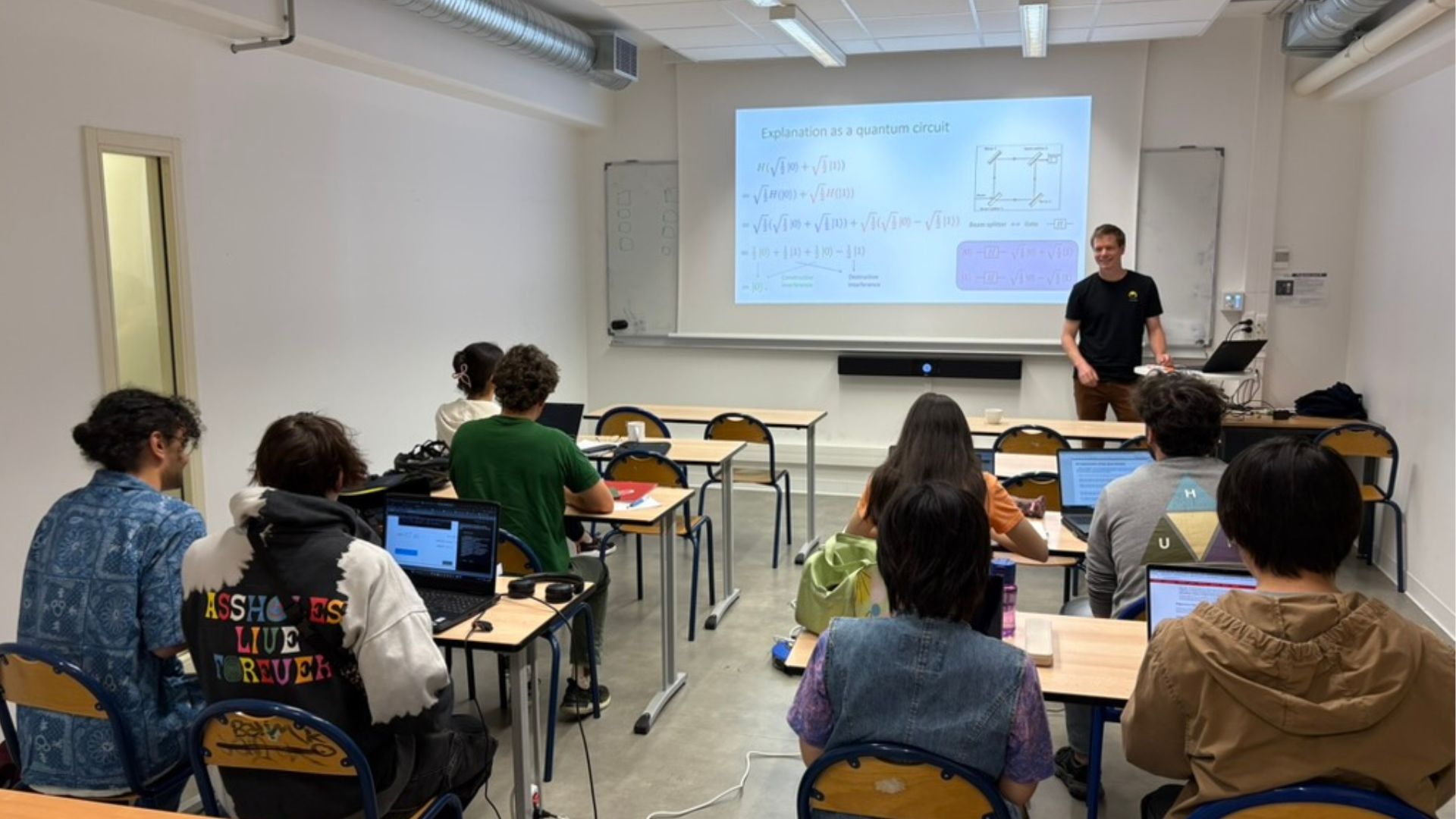The Graduate School Quantum Technologies of Université Paris Cité organised a one-day introductory session on quantum programming, led by Vivien Londe, a quantum computing specialist.

Attendees included interns from the Graduate School’s two masters programs, PhD students from the Institut de Recherche en Informatique Fondamentale (IRIF) and the Matériaux et Phénomènes Quantiques (MPQ) laboratory, and IRIF post-docs.
During the day, they had the opportunity to learn how to code well-known quantum algorithms using a quantum software development environment.
No prior knowledge of a quantum programming language was required, only a basic knowledge of the Python programming language was recommended for accuracy analysis.
Understanding a key concept: “phase estimation”
The morning session was dedicated to a fundamental algorithm in quantum computing: “phase estimation”.
Quantum computing specialist Vivien Londe showed students how this algorithm works, making it one of the most important quantum algorithms for chemistry.
Let’s pratice: “Hamiltonian simulation”
The afternoon session introduced students to Hamiltonian simulation. How does it work? Use a quantum system that we control well (the quantum computer) to simulate another quantum system that we want to investigate.
An instructive session appreciated by students
“It was an excellent opportunity to get an overview of some key concepts in quantum programming and to start working with quantum programming languages. Fundamentals as well as more specialized topics were clearly explained.” Student attendee
“The session is very well designed. I appreciated the simplifications made to the content, for example the implementation of a simple example of phase estimation instead of the more general version, which is very instructive and makes the session more accessible. I also really liked the illustration of phase estimation with the analogy of water waves and light beams.” Student attendee
À lire aussi

Le Collège de l’Académie nationale de médecine : une première promotion marquée par l’engagement de l’Université Paris Cité
Créé en décembre 2023, le Collège de l’Académie nationale de médecine se veut être un lieu d’échanges entre les académiciens et des jeunes médecins, chirurgiens, biologistes, scientifiques, pharmaciens, vétérinaires. Il réunit ainsi 38 jeunes scientifiques, dont 15...
read more
Journées mondiales sans téléphone portable 2026 : repenser notre rapport au numérique
Du 6 au 8 février se tiennent chaque année les Journées mondiales sans téléphone portable. Cet événement constitue une opportunité pour la communauté universitaire de s’interroger sur ses usages numériques et d’en analyser les impacts environnementaux, sanitaires et...
read more
Interdiction des réseaux sociaux aux moins de 15 ans : ce que dit la recherche
L’Assemblée nationale a adopté, le 26 janvier 2026, la proposition de loi interdisant l’accès aux réseaux sociaux aux moins de 15 ans. Face aux inquiétudes liées au cyberharcèlement, à l’isolement ou à la désinformation, Grégoire Borst, professeur de psychologie du...
read more
Lancement du nouvel ouvrage de Pinar Selek : Lever la tête. La recherche interdite sur la résistance kurde
Cette soirée de lancement se déroulera le 16 février 2026 à 18h, à l’Université Paris Cité, Grand Amphithéâtre, situé 12 rue de l’École de Médecine, en présence d’Édouard Kaminski, président de l’Université Paris Cité.Pinar Selek revient pour la première fois sur sa...
read more